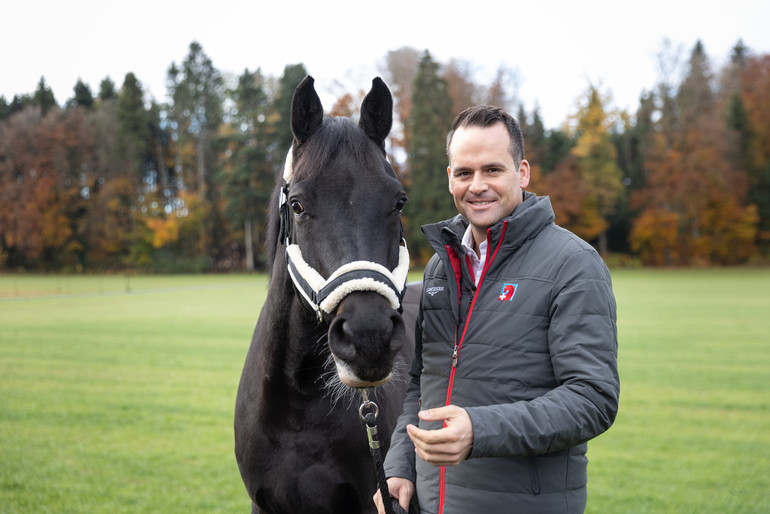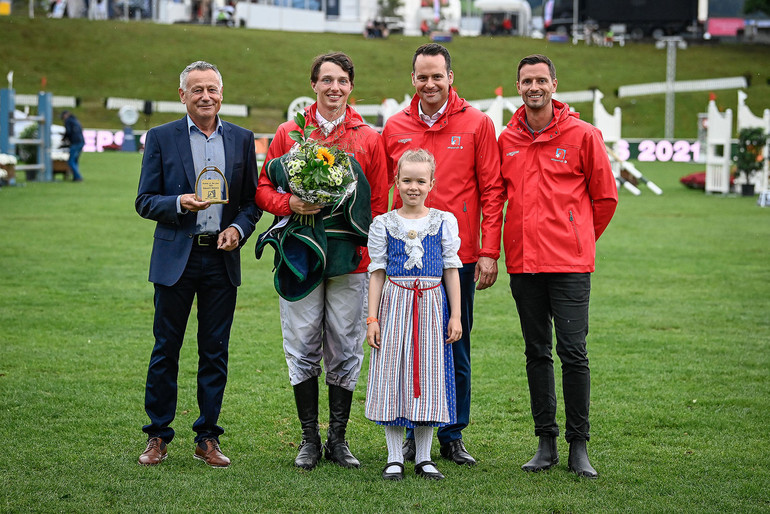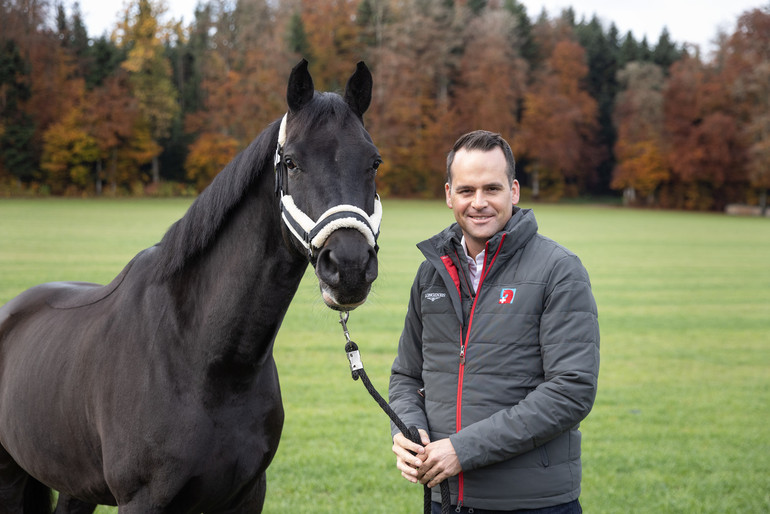Text © World of Showjumping
“We have to be better communicators,” Damian Müller, the president of the Swiss Equestrian Federation, tells World of Showjumping. “That does not mean that the people who have been involved in the past have not done a good job, but our circumstances are evolving rapidly; we cannot be passive, we have to be pro-active. There are some questions we as a community have to ask ourselves and maybe all of them are not comfortable – but that is life, it is not comfortable all the time.”
“I believe that the biggest challenges for our sport today go hand in hand: First of all, horse welfare and the questioning of our social license are the main issues. Secondly, we have to be better with our communication, and thirdly, we need good officials.”
“We have to speak about the role of the horses in society, and what we want to do with our horses in the future,” Müller says. “We have to be pro-active and think about how we can place the horse and horse welfare within our society now and in the future, to ensure that we can be successful in all our disciplines – and that we still can ride.”
Horsemanship should not be lost
Müller himself started riding at the age of eight, competed in small jumping classes and then moved on to work as a speaker at equestrian events. “Given my close connection to the sport, I know what it is about; the relationship between humans and horses. In the past, people used to be more engaged with horses and it is really important to now educate the younger generations so that horsemanship won’t get lost. We are today building the future of our sport with the next generation, and we need to teach our young athletes good practices from an early age. They need to be made aware of horse welfare so that they understand as early as possible what a horse needs, and what they as a rider can and cannot do. This is a key issue. It also means learning the right way to communicate and being aware of the strategy put in place to develop the sport. The reason we love equestrian sport, no matter which discipline, is because we love horses – we must always remember that.”
It is really important to now educate the younger generations so that horsemanship won’t get lost
“When I look towards the future, I believe we have to recreate the relationship between the horses and society as a whole. It is something we had in the past; humans were really together with the horses – horses helped us in agriculture, in daily life, and in war, but with the industrialization everything changed. Nowadays, horses have been domesticated and are seen as pets. We have to speak about the relationship we have with horses, and how we want this relationship to be in the future,” Müller points out.
We need to teach our young athletes good practices from an early age
“Personally, what I enjoy the most about our sport is this relationship with the horse,” he continues. “Furthermore, we are the only sport that does not have any gender rules; we bring men and women together, as well as young and old – and we bring humans and horses together. Our sport is not about training yourself alone, you are always in a partnership, always – and the team behind you has to be very strong as well. I really appreciate what the grooms do, they are together with the horses all the time. We are like one big family in this sport, and I think it is important to promote this mindset of togetherness.”
One foot in the Swiss Parliament
In 2011, Müller was elected to the parliament of the Canton of Lucerne. In 2015, he was elected by the people of Lucerne to the Council of States, as one of two representatives of the 46-member chamber. When Charles Trolliet – the president of the Swiss Equestrian Federation at the time – in 2017 started to look for someone to replace him, he contacted Müller. “He thought the Swiss Equestrian Federation needed to have one foot in the Swiss parliament, because when we speak about animal protection and the future of our sport in general, the political aspect is very important,” Müller explains. “With my years in the sport, I knew how the Swiss federation worked and I was interested in creating a future together. However, I wanted to be the vice president first to see how everything really functioned.”
In 2018, Müller became vice president and was then appointed president in 2021. “When I started as president, I launched the 2030-strategy – and it had taken us more than two years to create that vision for the future. We have to consider both the past and the future, and first of all this means education. Another point we have to consider are the investors we have in sports. Our sport lends itself to medium- and long-term investments because the history of our sport is also based on a long tradition. When we think about more sponsorship partners, we have to think about sponsors who have passion and not sell our sport short. However, brands that are not interested in our sport today may become interested if we bring the sport to them and better explain all that it represents. We have to work together to shape the future of our sport, including marketing.”
Zero tolerance for rule violations
When it comes to rules and regulations, Switzerland has very strict laws for animal protection and this is reflected in the Swiss Equestrian Federation’s approach, Müller points out. “As a sport, we have to have rules,” he says. “Behavior that is a violation of our rules and the law, is a violation against the horse. Therefore, when it comes to the regulations we have in place, we have to define our goals for the future.”
We really have to have a strategy for the future and we have to see how society around us is changing
“We should not overregulate either; you cannot change the rules to cover every single situation that can occur – because a bad person cannot be changed by changing the rules, and there will always be certain individuals who believe rules do not apply to them,” Müller says. “We have to focus on educating everyone on the best practices, and have rules in place that align with our bigger goals – and have zero tolerance for any breaches. And when we speak about goals, horse welfare and how the animals are cared for should be the main focus. Another point of focus should be the officials, because in the end they are the ones who make sure rules and regulations are followed. We need good quality officials and that means we have to educate and prepare them. We need a strategy; how can we get the right people involved? We cannot only speak about horse welfare though; we also have to speak about the welfare of our young riders – we have to be a safe sport. This issue is also central early in a rider's career.”
You cannot have a sport and not care about the politics
“We cannot forget the political dimension either; our rules and regulations within the sport are political issues,” Müller continues. “We can speak about horse welfare and the future, but if we don’t speak about politics, we don’t have a chance. Mixing sports and politics is very important. You can say that politics is a mess, but at the end of the day, politicians are responsible for our laws. As a sport, we have a lot to improve in this regard. We really have to have a strategy for the future and we have to see how society around us is changing. We have to know which stakeholders are needed so that we can reach our goals – and we have to involve those stakeholders. You cannot have a sport and not care about the politics.”
Clear communication
Müller believes good communication is key when it comes to the future of the sport. “If you take the example of the recent protests at some of the events, these activists do not understand what we are doing with our horses,” he explains. “They create false accusations and the media transports their message. Not all journalists understand what our sport is about and what we do with the horses; those who are not truly involved in the sport see these protests and give them attention, without understanding what they are writing about. Also in this regard, we as a community have to be pro-active and educate. When I look at our events and see what we are showing on TV, we have to make sure the message is positive.”
“The problem in our community is that we like to look for the mess, there is a lot of finger-pointing, and we don’t see the opportunities,” Müller says. “And as a sport, we have huge potential! I believe that 99% of our community are good to their horses, and we should focus on them while having zero tolerance towards those who break the rules. It is another mindset, but we have to be clear in our communication.”
“I believe that national federations should communicate with each other a lot more as well,” Müller continues. “The FEI should create a communication platform for the federations, and we should not only speak about the top sport, but how we can support our local clubs, the mechanisms we have in place… In general, we have to communicate better and work together: We are all faced with the same issues. Our problems are not a question of showjumping, not only about dressage, these are global issues and we have to tackle them together, step by step.”
We are all responsible
“I do think the FEI tries to do a good job,” Müller points out. “We should not just finger-point against the FEI all the time, we also have to help; all the federations have to come together to create our future together.”
“It seems like a cute idea, but I am 100% sure that the only way to have a sustainable future as a sport is to work together. Because in the end, who is the FEI? We all are the FEI, and we are all responsible for the future. We have to network and develop together; we can never be active enough.”
It is all about strategy and tactic, knowing our goals and where we want to go
“When it comes to the role of the riders, they have to know that if they are not thinking forward and participating in campaigns that are pro-active in horse welfare and animal protection, they cannot be a part of our sport,” Müller concludes. “I think most riders know exactly in what position they are in, but they need help. We need the top competitors to involve the next generation, because the young people need somebody to look up to, someone to learn from; they need inspiration and we as a community have to offer that to them. Social media has huge power, both positive and negative. We have to be really awake to what is really going on in the community, and then create campaigns to address those issues.”
“It is all about strategy and tactic, knowing our goals and where we want to go. If you ask the FEI, how do they see our sport in 2030, what do they say? I know what we as the Swiss Equestrian Federation are saying: We want to ride, we want to have a thriving sport. However, to give our goals more value, we also need to know how we can reach these goals,” Müller closes off.
22.3.2023 No reproduction of any of the content in this article will be accepted without a written permission, all rights reserved © World of Showjumping.com. If copyright violations occur, a penalty fee will apply.











